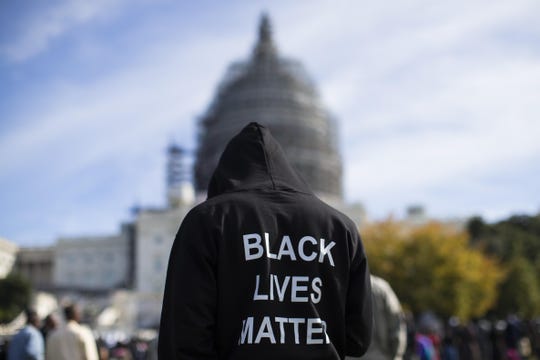
Americans have taken to the streets in the millions in protest, and after more than a week of demonstrations that have spread to hundreds of communities, we’ve seen action: A law that would require police training in understanding implicit bias and how to de-escalate conflict sailed through the state Senate on a unanimous, bipartisan vote. A new de-escalation training center is set to open at Wayne State University in Detroit. Gov. Gretchen Whitmer has voiced support for laws that would require officers to intervene in acts of violence.

These are vital first steps, and this work must continue.
But systemic racism neither begins nor ends with police brutality. So the cure cannot end there, either.
We have to talk about our schools.
Detroit activist Teferi Brent challenges white protesters to go deeper, asking: “Are you going to tell me a black life doesn’t mean something unless the police take it?”
When seven black Detroit students realized that their only recourse was to sue the state, because their schools’ continuing deterioration under more than a decade of state oversight had left them without the wherewithal to become literate, we are telling them that their lives do not matter.
And when white Michiganders allow this situation to persist, year after year, blaming Detroit parents, teacher unions, the students themselves — anyone but ourselves — or voicing sympathy, but insisting they and their elected leaders are powerless to help, we are telling those students that their lives do not matter.
The change America requires has to go beyond addressing police brutality. And it must include our schools.
“It feels as if we believe certain children mean more, and are more valuable than other children. Very specifically, white children in certain neighborhoods, and certain districts, are valued more than black children,” said Nikolai Vitti, superintendent of the Detroit Public Schools Community District. “That’s not hyperbole, it’s how the state allows the school funding formula to exist.”
Prop A, the 1994 school funding reform legislation, was intended to erase disparity by eliminating local taxes and funding districts equally. But the legislation allowed some wealthy districts to continue to levy local taxes, boosting their funding beyond the state’s per-pupil allowance.
Every education policy group is supportive of equitable funding, says Tonya Allen, president and CEO of Detroit’s Skillman Foundation, yet nobody wants to take the first step to make that happen.
Because that is, for many Michiganders who say they believe that black lives matter, where the buck stops: When giving more to kids in Detroit means less for kids in that affluent suburb.
But that’s the wrong way to look at it.
Michigan could, for example, increase the foundation allowance in districts that lag while holding wealthy districts’ allotment steady, or free funds in some other part of the budget.
“The fact that kids in Detroit and the UP, or kids in Benton Harbor, or southwest Michigan, are not getting what they need to be effective contributors to the economy is a statewide issue,” she says. “We’re either going to pay the piper today, or we’re going to pay it later.”
Michigan likes to pay later, Allen says, and as a result, our state has a widening achievement gap and worsening school performance.
It is impossible to ignore the reality of the budget shortfalls caused by COVID-19.
Schools statewide are facing cuts; in DPSCD, Vitti said, it’s about $40 million for the next school year. Vitti believes that with cuts at the central office and expected federal money, he can balance the district’s budget while protecting teaching jobs and salaries, and student programming. If the cuts aren’t steeper than expected.
But what if, instead of cutting school budgets, Michigan decided to do something different?
“This becomes almost cliché, but your budget is a representation of your values,” Vitti said. “I would argue that with state revenues down, how do you inject one-time money to protect K-12 education? If I were in the House or Senate, if I were governor, that’s the conversation I would be having.”
Michiganders can prompt those conversations. The thousands marching can reach out to the lawmakers now willing to cast a vote for police reform, and insist that they take the next step to a more equitable Michigan by supporting black students.

Be the first to comment